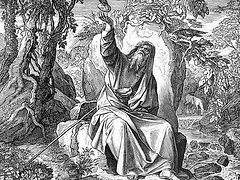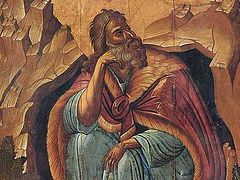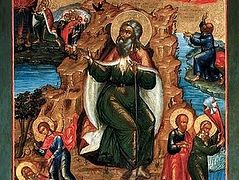On July 20/August 2, Orthodox Christians celebrate the memory of the Prophet Elias, customarily called in Russia, “Elias day”. It is one of Russia’s favorite feast days. And the prophet himself was always extraordinarily honored. In the History of Bygone Years, otherwise known as the Primary Chronicles, the Church recalls a church dedicated to St. Elias that stood in Kiev in 944—that is, before the Baptism of Russia. And how many more were built later!
But why did the ancient Jewish prophet, who lived eight and a half centuries before the birth of Christ, become so popular among the people? He was so popular that St. Elias day was celebrated as a major feast day—with a common meal call a “bratchina” or “brotherly meal”, for which a bull or ram was bought from a fold and specially killed. The day was so honored that it was categorically forbidden to work, considered a sin to do so, and the celebration itself of St. Elias day itself always began in church. Moreover, although there was no special church rule concerning it, many of the faithful fasted for a week prior to St. Elias day. Such was the people’s piety and admiration for this ancient Jewish prophet, who was received by Russians as absolutely their own; and it is enough to recall how many folk sayings there are dedicated to St. Elias. “Before St. Elias the priest won’t be able to pray down rain, but after St. Elias the peasant woman can bring it on with her apron,” as we read in the dictionary of the folklorist V. Dal. “Elias the Prophet rolled back two hours of daylight.” When it thundered they would say, “There’s Prophet Elias riding across the heavens on his fiery chariot”—and St. Elias day itself, as they would say, “is not worth it without thunderstorms.”
Why is this so? Why did the people so honor the prophet? First of all, our ancestors studied the “Law of God”, and therefore they knew the Biblical chapters of the Old Testament that tell us about this amazing prophet. They knew of course that St. Elias’s service came at a time when Israel was being ruled by the weak-willed Ahab, who took to wife the depraved pagan Jezebel. A loose and corrupt woman who corrupted others, Jezebel built temples all over the country to the fertility idol Baal, kept in the court a multitude of effeminate priests of the cult of Baal and Astarta, held regular orgies, instituted temple prostitution, and of course destroyed all those who had the courage to go against the insanity that had taken over the country. During this dangerous time for the people and government of Israel, Prophet Elias raised his voice.
The Bible describes in detail the episode of his struggle with the depraved Jezebel, and it was a struggle that took place before everyone’s eyes. It was extremely important that those not firm in their faith would not follow after the all-powerful, cruel, and cunning queen, who was essentially destroying not only all norms of morality, but faith in God itself. It was extremely important to prove to the wavering or weak who were ready to follow after Jezebel that the Lord considers this a ruinous path; to show that truth, which means also power, belonged to God, and not to the ruling harlot. This was precisely the sense of the amazing miracles shown by the faith of Prophet Elias during his stand against the cult of Baal so abominable to God.
Of course, God does not often manifest His miracles in visible and inarguable forms—for example, igniting water through prayer against all obvious laws of nature; or rain that puts an end to a long drought; life in the desert, when birds bring you your food; or inexhaustible storehouses, when the Lord Himself takes care for them. Even the resurrection of the dead! All of these miracles in the life of the Prophet Elias are scrupulously described in the Bible. And these pages of the Bible, naturally, could not have left our ancestors indifferent. After all, such visible manifestations of miracles are extremely rare—the Lord does not force His omnipotence on anyone. But if something like this does happen, the episode is remembered through the ages. We, alas, are of very little faith, and our faith too often needs to be supported by miracles. And we admire those who were worthy to take part in those miracles. Of course, our ancestors understood also the essence of St. Elias’s struggle, honored his integrity, resolve, and steadfastness. Without a doubt, they were also captivated by how Prophet Elias was a struggler for fairness. Probably all of this taken together made the distant prophet so dear to us: thunderous and all-powerful (even the rain and thunder were subject to him!), but at the same time homey, allowed into all corners of the people’s life.
Now raise your eyes to heaven. Is it sunny? Or is it cloudy and gray today, on St. Elias day? Our ancestors considered that our future depends upon what takes place in the heavens on this day—whether there will be a harvest in the coming year. And Russia’s airborne troops have also chosen precisely the prophet of God Elias as their heavenly patron; and they are celebrating this today.





